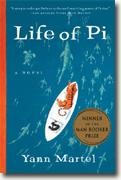Life of Pi
Yann Martel
book reviews:
· general fiction
· chick lit/romance
· sci-fi/fantasy
· graphic novels
· nonfiction
· audio books
· author interviews
· children's books @
curledupkids.com
· DVD reviews @
curledupdvd.com
newsletter
win books
buy online
links
home
for authors
& publishers
for reviewers

 |
Life of Pi Yann Martel Harvest Books Paperback 336 pages May 2003 |
|
Click here for Dana De Zoysa's bonus review of Life of Pi What is there to say about a novel in which a young boy shares a lifeboat with a fully grown Bengal tiger named Richard Parker? If the book is Yann Martelís Life of Pi, thereís quite a lot to be said. This is definitely one of the most unusual novels of the year (if not the most), yet the story it tells is so profound and moving that the more enlightened readers will get behind its many oddities to the message at its core.
Eventually, the family Ė which, in addition to Pi and his father, includes a mother and brother -- decides to move to Canada, taking much of its menagerie with it. Along the way, the ship sinks, stranding Pi on a lifeboat with the aforementioned Richard Parker, along with a few other zoo animals (who, it should come as no surprise, quickly disappear as their voyage progresses). As Pi desperately searches for a place to call home, he and his feline companion form an uneasy truce, and embark on a series of unforgettable adventures that include, among other things, a blind Frenchman and a man-eating island covered in meerkats. Thereís also passage upon passage explaining how Pi and his friend manage to combat the twin demons of thirst and hunger without turning on each other. But Life of Pi isnít just a simple adventure story. The bookís final pages include a revelation that brings the rest of Piís fantastic story into question. But instead of seeming silly and fraudulent, as such twists often do, the ending makes the rest of the story that much more meaningful. At its core, the book is about manís relationship to animals, and his relationship to God (Pi, as the book explains in some detail, is Hindu, Islam and Christian). Most importantly, the book is about faith Ė about how believing something sincerely can make it, if not completely real, at least close. Life of Pi is a simply extraordinary book that actually has something to say about life, yet itís not preachy or overbearing. Itís just a strange, fascinating and remarkable tale that may even, as its prologue predicts, make you believe in God. © 2002 by Amanda Cuda for curledup.com. |
|
|
|
 Click here to learn more about this month's sponsor! |
|
| fiction · sf/f · comic books · nonfiction · audio newsletter · free book contest · buy books online review index · links · · authors & publishers reviewers |
|
| site by ELBO Computing Resources, Inc. | |
 The book is, of course, the story of Pi (short for Piscine), an Indian teenager whose father runs a zoo. Much of the bookís first section is a detailed description of the minutiae of zoo-keeping, including several lessons about the connection between man and animal that come into play later in the novel.
The book is, of course, the story of Pi (short for Piscine), an Indian teenager whose father runs a zoo. Much of the bookís first section is a detailed description of the minutiae of zoo-keeping, including several lessons about the connection between man and animal that come into play later in the novel.